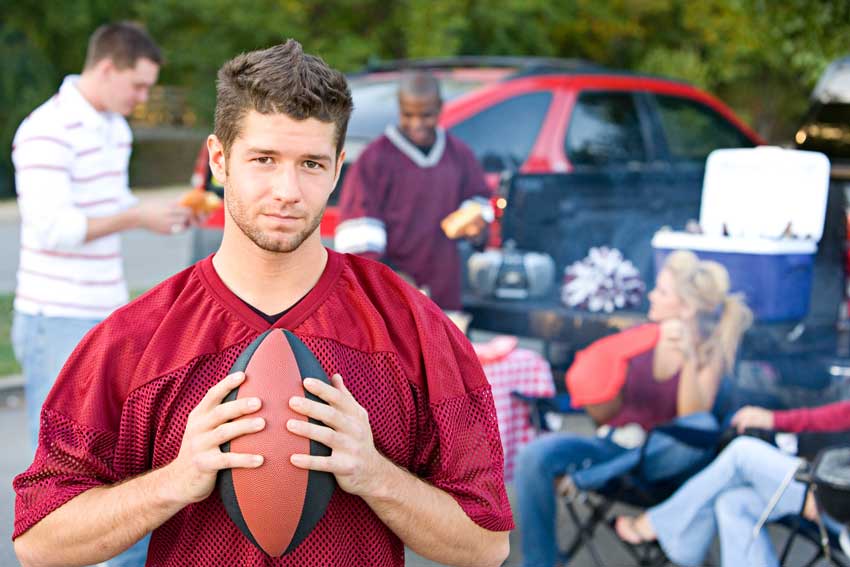From tailgating before “the big game” to upcoming holiday parties, there are countless settings that can challenge the new-found sobriety of those in recovery from alcohol abuse.
While the alcohol flowing at parties and tailgating events may be enjoyable for many, it can be very difficult to be around for those in recovery.
It is important to have strategies for your resistance prepared going in to any event where you know alcohol will be served or where you know people will be offering you drinks. You may worry about what others will think or how they may react if you refuse alcohol.
Remembering that it is your life and your decision to make – not theirs – can be an effective challenge to these worries. Your wishes and decisions should ultimately be respected, especially by your peers. Remind yourself that you alone are in charge of your life and how you envision your life of sobriety. There is no external authority denying you or imposing rules on you. You have decided to make a change.
Honesty and Polite Refusals
The most effective way to protect your recovery and sobriety is to learn how to say no. The best way to do this is to find polite and casual responses to an offer of alcohol which give you an excuse that cannot be argued with. These types of refusals won’t offend your host, won’t embarrass you, and won’t expose your personal recovery story if you choose to keep it to yourself.
It can be extremely difficult to say no, especially the first few times you try. Practice some scripted lines and role-playing scenarios to find your most comfortable responses and build your confidence. You can do this on your own or with a friend/family member/mentor. The goal is to be clear, firm, and respectful.
Finding concise, simple responses is the key. Long explanations or being too vague can draw out the discussion and offer more opportunities to hesitate or be convinced to give in to the temptation. Maintaining eye contact with the person and keeping a polite smile goes a long way.
Some irrefutable responses can include:
- “Sorry, I’m driving.” Volunteering to be a designated driver gives you not only a great excuse to avoid alcohol, but it also ensures your friends and family have a safe way home as well!
- “No thank you, I’ve already got/just finished something.” Even if it is a non-alcoholic drink, it is most certainly still a drink.
- “I think I’ll just have a water/soda this time, please.” Spacing out one’s alcohol consumption is common, so this refusal shouldn’t garner much unwanted attention.
- “I can’t be hungover tomorrow.” Citing work, an early meeting, or class/exams if you are in a college crowd are all viable excuses to avoid alcohol.
- “I don’t drink (anymore).” This response is the hardest and most courageous because it can draw the most prying questions. However, depending on how comfortable you are with your sobriety and recovery story, it can be cathartic to make this proclamation.
Alternatives and Options
Aside from your honesty and your polite refusals, there are a variety of other options to non-verbally avoid alcohol without drawing attention or risking ridicule from others. It is again very important that you remember this is your decision to remain sober. You don’t owe anyone an explanation for the choice you have made.
Having a friend or group of friends who know your struggle and can give you encouragement and support goes a long way toward keeping your sobriety intact. If you are in a crowd with few familiar faces or without anyone who is aware of your recovery story, you can try to seek out others who appear to also be staying sober or carefully limiting their alcohol consumption.
Carrying a non-alcoholic drink can be very effective as a deterrent also. If you already have something in your hand, regardless of what it is, few people are going to push another (alcoholic) drink on to you.
You can even take it a step further and request your non-alcoholic soda or virgin cocktail be served in the same type of glass as an alcoholic one if it is a function where the bartenders differentiate in this way, so you don’t feel conspicuous or draw unnecessary attention.
Know When Enough Is Enough
There will always be times when pushy people continually offer you alcohol despite all your refusals and attempts to dodge the situation. Sometimes these people are unaware of your recovery and sobriety. When this person is a friend, it can make the situation even more uncomfortable and difficult.
Being firm and repeating the same excuse with every attempt can sometimes deter them. You can also try asking politely for them to respect your choice and cite an irrefutable excuse. Something along the lines of, “I’m trying to cut back/not drink (to take care of myself/to be healthier/because my doctor told me to) and you’re making it difficult. I’d appreciate your support.”
Avoiding the situation or simply walking away may end up being the best option in some cases. Having a plan and an exit strategy can both be very important, especially to those who are in the early stages of their recovery journey.
Alcohol and being around others consuming it can be a trigger for anyone striving to recover from an alcohol use disorder. The temptation to “just have one” can be very strong, especially in certain company. However, this is a dangerously slippery slope that can lead straight to relapse.
If you are invited to an event where alcohol will be prevalent, yet you want to maintain your sobriety, it is important to have a plan in place for rejecting offers and also an escape route should the temptation become too much for your willpower to handle.
You have decided to put your health and those you love ahead of your addiction to alcohol, and you don’t need to feel obligated to explain that decision to anyone. Should you choose to, that is always a very effective way to reject drink offers. However, if you think they won’t understand, don’t know them well, or think they may be judgmental or pressure you because of your choice, know there are many options to avoid the peer pressure and politely decline.
Your decisions, whether spoken or non-verbal, will let people around you see that alcohol does not rule your life, refraining does not impede your ability to enjoy the party atmosphere, and you refuse to let over-consumption of alcohol interfere with your ability to function the next day. This can also lead to you becoming a role model among your peers for others looking to cut back on their own alcohol consumption.











